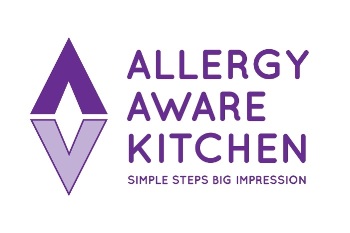New Food Allergen Law - Food Information Regulations
December 13th 2014 marks the introduction of the Food Information Regulations (EU1169/2011) which is being introduced by the Food Standards Agency and DEFRA. These regulations bring together and update a series of existing regulations regarding nutrition and allergen ingredients information.
We spoke to Liz Allan, founder of Allergy Aware Kitchen, to find out what advice she has for food business owners regarding the new regulations.
What are the requirements of the regulations?
The regulations relate to non-pre-packed food. In other words, food which you have made on your premises which will be sold without any packaging to the final customer (ie. all items on the menu) or items packed on the premises for direct sale (ie. sandwiches, wraps, pastries, cakes etc).
Food services businesses will have to provide ingredient information on the EU Top14 allergens contained in the dishes they provide to their customers.
The regulations apply to all food service organisations such as: Restaurants, Cafés, Coffee Shops, Pubs, Works Canteens, Schools, Nurseries, Hospital and Prison food, Conference Catering, Wedding Receptions - in fact everyone providing food in a catering setting will have to adhere to the new regulations. It also covers unpackaged foods sold in retail at a deli counter in a supermarket or butchers.
Why are they being introduced?
Evidence shows that people with food allergies are having allergic reactions when they eat out. Some people with allergies do not eat out because for fear of this happening.
What do businesses need to do to comply?
Businesses will need to be able to provide clear and accurate ingredients information about the EU Top14 allergens contained in the dishes on your menu which you have used as an "intentional" ingredient. You can choose to supply this information "orally" but it also needs to be captured in writing and available to staff so that they can answer customer questions. If you are unable to have allergen information on your menu, you will need to have signs which highlight where the information is available such as: -
- Before you order, please inform our staff if any of your party have a Food Allergy, Food Intolerance or Coeliac Disease
- For allergen information please speak to a member of our team
Make sure all staff have received basic training about food allergies and EU Top14 allergens. Ensure that there are experienced staff available per shift to field customer questions. Staff also need to be aware of where the allergen information is kept so that they can find it easily. Regularly communicate all ingredient changes with your staff and customers. Put in place an emergency protocol in case allergic reactions happen whilst customers are on your premises.
What can't businesses do any more?
You can't say you don't know if any allergens are present in the food you serve.
What do businesses need to do?
- Check all menu items to ensure that you know exactly which allergens they contain
- Talk to your suppliers to as they need to provide you with allergen information when they supply your ingredients
- Where do you keep your recipe information? Make sure you keep a record of your ingredients for each item on your menu so that you are able to supply clear and accurate ingredients information
- The Food Information Regulations relates to “Intentional ingredients” within your dishes so you will also need to manage allergen cross contamination as part of your Food Safety Policy

How can they provide this information?
- You can show allergen information on your menu under each item (contains gluten, milk, soya etc)
- On a chalkboard next to each item (contains gluten, milk, soya etc)
- Orally, but you need to make sure you hold allergen information in writing, where you or your staff can find it so they can answer customer questions
- If you prefer not to supply allergen information on your menu or chalkboard, make sure you provide clear notices letting them know where the information can be found
EU Top-14 Allergens
Gluten, Milk, Soya, Peanuts, Tree-Nuts (Almonds, Hazelnuts, Walnuts, Cashew, Pecan, Brazil, Pistachio), Sesame, Sulphites, Egg, Molluscs (snails and clam, squid, cuttlefish and octopus – with a soft under belly), Crustaceans (lobster, crabs, shrimp, crayfish), Fish, Mustard, Celery, Lupin. (These are the allergens which cause the most allergic reactions within Europe. There are over 150 foods which have caused allergic reactions worldwide).
What do these regulations mean to customers?
Your customers will be able to ask about any of the EU Top14 allergens contained in the food you supply to them, whether they have food allergies or not. You will not be able to say that you don't know.
Food Allergy Awareness & Training
Food service staff will need to be aware of what allergens are contained in their dishes. They also need to understand how to control and prevent cross contamination when preparing and serving food to allergic guests. This applies to all food service staff, kitchen, counter, bar and front of house as all are involved in the process.
Although Food Allergy Awareness training is not compulsory, it is suggested that all staff are trained in order for food service organisations to be able to fully comply.
About Allergy Aware Kitchen
Allergy Aware Kitchen offer Food Allergy Awareness Training Courses for Food Service and gives you the knowledge to be able to ensure your organisation complies with the Food Information Regulations (EU1169/2011) which are being introduced 13th December 2014.
In order for you to supply the information required by the regulations your staff need to be aware of what are the allergens, how they can cause allergic reactions and how to prevent cross contamination when preparing and serving food to your allergic customers. This applies to all food service staff, kitchen, counter, bar and front of house staff as all of them are involved at some point of the process.
Liz Allan is the founder of Allergy Aware Kitchen. She previously ran a successful company supplying allergy friendly cakes to consumers, one of which won a free-from Food Award in 2012. Liz worked in business improvement for a number of years. She also has food intolerance so has been unable to eat gluten or wheat for over 10-years. Liz's passion for the allergy sector is reflected in the Food Allergy Awareness Courses that Allergy Aware Kitchen supply. Allergy Aware Kitchen Limited is a Theo Paphitis Small Business Sunday Winner (#SBS)
For more information visit www.allergyawarekitchen.co.uk
